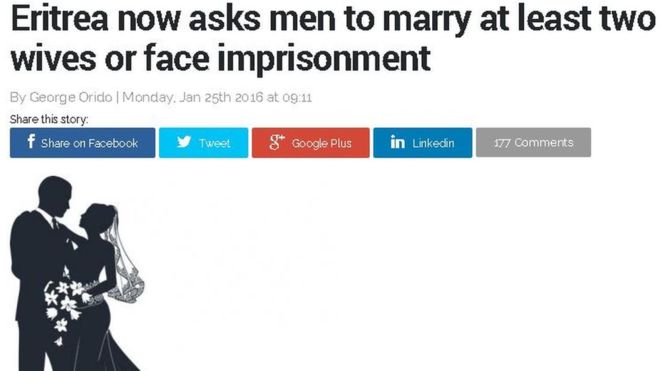- Stay Connected
Eritrea ‘appalled’ by hoax forced polygamy story
A satirical story that Eritrean men have been ordered to marry at least two wives, which has been shared across Africa, has upset Eritrean officials.
“Even a madman in [the Eritrean capital] Asmara would know that this story was not true,” an Eritrean official told the BBC.
The hoax was first published online on a Kenyan news site called Crazy Monday.
Some men have commented on Twitter that they are ready to travel to Eritrea to find a new wife.
Crazy Monday, which is published by the Standard newspaper, is well known for its focus on scandalous stories and gossip as part of an attempt to attract a younger readership, says Mathias Muindi from the BBC’s media monitoring service.
But this has not stopped it being reported in many countries from Nigeria to South Africa, with some suggesting that it was true.
The story said that to make up for the shortage of men in the country, following the civil war with Ethiopia from 1998-2000, every man must marry at least two women or face imprisonment.
It has been trending on Twitter in Nigeria, and other countries, for several days with people sharing links to the Eritrea’s visa application documents.
‘Dark Forces’
Eritrea’s Information Minister Yemane Gebremeskel tweeted that “the media frenzy to parrot this ludicrous, fabricated and trite story… is appalling”.
One news website, Sahara Reporters, has retracted the story acknowledging that it was false.
In another tweet Mr Yemane said “the story illustrates [the] vileness of the dark forces of disinformation and proclivity of others to readily embrace the negative narrative on Eritrea”.
The New York-based group Human Rights Watch says that there is a “dismal human rights situation” in Eritrea and the restrictions there, including on the freedom of expression, have led some to call it the North Korea of Africa.
BBC

